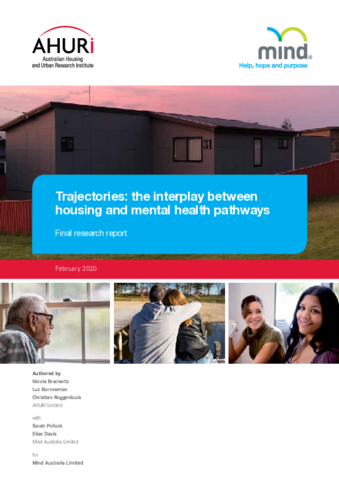Delivered by AHURI Professional Services
For Mind Australia
Mind Australia in collaboration with the Australian Housing and Urban Research Institute (AHURI) have conducted a national study, Trajectories: the interplay between mental health and housing pathways, to develop a clearer understanding of the housing and mental health pathways of people with lived experience of mental ill-health. The research project aimed to identify typical housing and mental health pathways, the intersection of these pathways, and potential points of intervention.
The research found that safe, secure, appropriate and affordable housing is critical for recovery from mental ill-health and for being able to access appropriate support services. Yet, there is a shortage of appropriate housing options for people with lived experience of mental ill-health.
The quantitative analysis showed that poor and deteriorating mental health directly impact housing stability (as measured by forced moves and financial hardship). People who experienced severe psychological distress had an 89 per cent increased likelihood of financial hardship in the following year and a 96 per cent increased likelihood of financial hardship within two years. People with a diagnosed mental health condition had a 39 per cent increased likelihood of experiencing a forced move within one year.
The quantitative analysis showed that mediating factors, such as social support, good general health, and accessing mental health and other health services, can reduce the likelihood of housing instability and shorten the length of time a person experiences mental ill-health. Conversely, an absence of mediating factors and experience of negative life events can amplify the relationship between housing instability and mental ill-health.
Housing and mental health policies use ‘ideal pathways’ to conceptualise how people travel through systems. Contrary to the ideal social housing pathway circumscribed by policy, actual social housing pathways are rarely linear and are shaped primarily by eligibility criteria, a need to ration social housing and target it to those most in need, and the way in which social housing policies are operationalised. Similarly, mental health policies do not accurately reflect the real-life trajectories of many people with mental ill-health. Rather, people experience non-linear trajectories.


